
Jewish prayer is the prayer recitation that forms part of the observance of Rabbinic Judaism. These prayers, often with instructions and commentary, are found in the Siddur, the traditional Jewish prayer book.

The role of women in Judaism is determined by the Hebrew Bible, the Oral Law, by custom, and by cultural factors. Although the Hebrew Bible and rabbinic literature mention various female role models, religious law treats women differently in various circumstances.
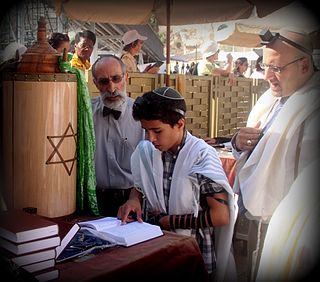
Bar Mitzvah and Bat Mitzvah refer to the Jewish coming of age ritual. The plural is b'nei mitzvah for both boys and mixed gender groups, or b'not mitzvah for girls. The vast majority of celebrations accure at the age of 13 (boys) and 12 (girls).
Neo-Hasidism, or Neo-Chassidus, is an approach to Judaism in which people learn beliefs and practices of Hasidic Judaism, and incorporate it into their own lives or prayer communities, yet without formally joining a Hasidic group. Over the last century neo-Hasidism was popularized by the works of writers such as Hillel Zeitlin, Martin Buber, Abraham Joshua Heschel, Lawrence Kushner, Zalman Schachter-Shalomi, and Arthur Green.

The tradition of humor in Judaism dates back to the Torah and the Midrash from the ancient Middle East, but generally refers to the more recent stream of verbal and often anecdotal humor of Ashkenazi Jews which took root in the United States over the last hundred years, including in secular Jewish culture. European Jewish humor in its early form developed in the Jewish community of the Holy Roman Empire, with theological satire becoming a traditional way of clandestinely opposing Christianization.

In Judaism, a minyan is the quorum of ten Jewish adults required for certain religious obligations. In more traditional streams of Judaism, only males 13 and older may constitute a minyan; in more liberal (non-Orthodox) streams women are also counted.

The Dybbuk, or Between Two Worlds is a play by S. Ansky, authored between 1913 and 1916. It was originally written in Russian and later translated into Yiddish by Ansky himself. The Dybbuk had its world premiere in that language, performed by the Vilna Troupe at Warsaw in 1920. A Hebrew version was prepared by Hayim Nahman Bialik and staged in Moscow at Habima Theater in 1922.

Shlomo Carlebach, known as Reb Shlomo to his followers, was a Jewish rabbi, religious teacher, spiritual leader, composer, and singer dubbed "the singing rabbi" during his lifetime.

The Paradesi Synagogue aka Cochin Jewish Synagogue or the Mattancherry Synagogue is a synagogue located in Mattancherry Jew Town, a suburb of the city of Kochi, Kerala, in India. It was built in 1568 A.D. by Samuel Castiel, David Belila, and Joseph Levi for the flourishing Paradesi Jewish community in Kochi. Cochin Jews were composed mainly of the much older Malabari Jews and the newly arrived Sephardic refugees from the Portuguese religious persecution of Jews in Spain and Portugal. It is the oldest active synagogue in the Commonwealth of Nations. Paradesi is a word used in several Indian languages, and the literal meaning of the term is "foreigners", applied to the synagogue because it was built by Sephardic or Portuguese-speaking Jews, some of them from families exiled in Aleppo, Safed and other West Asian localities.
Partnership minyan is a religious Jewish prayer group that seeks to maximize women's participation in services within the confines of Jewish law as understood by Orthodox Judaism. This includes enabling women to lead parts of service, read from the Torah, serve in lay leadership positions, sit in a more gender-balanced format, and in some cases count as part of a minyan ("quorum") of ten men and ten women. Partnership minyanim began in 2002 simultaneously in New York and Jerusalem, and have now spread to over 30 communities in at least five different countries around the world.
Conservative Judaism views halakha as normative and binding. The Conservative movement applies Jewish law to the full range of Jewish beliefs and practices, including thrice-daily prayer, Shabbat and holidays, marital relations and family purity, conversion, dietary laws (kashrut), and Jewish medical ethics. Institutionally, the Conservative movement rules on Jewish law both through centralized decisions, primarily by the Rabbinical Assembly and its Committee on Jewish Law and Standards, and through congregational rabbis at the local level. Conservative authorities produced voluminous Responsa literature.
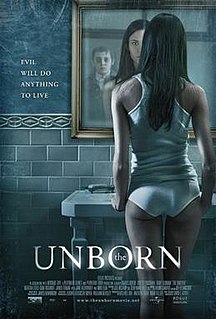
The Unborn is a 2009 American supernatural horror film written and directed by David S. Goyer. The film stars Odette Yustman as a young woman who is tormented by a dybbuk and seeks help from a rabbi. The dybbuk seeks to use her death as a gateway to physical existence. The film is produced by Michael Bay and his production company Platinum Dunes. It was released in American theaters on January 9, 2009, by Rogue Pictures. It was also the last film Goyer directed.
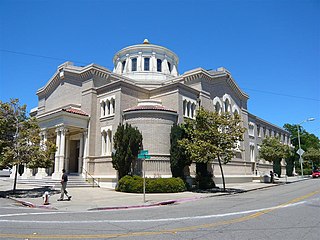
Temple Sinai is a Reform synagogue located at 2808 Summit Street in Oakland, California, United States. Founded in 1875, it is the oldest Jewish congregation in the East San Francisco Bay region.

Adas Israel, is located in the Cleveland Park neighborhood, It is the largest Conservative synagogue in Washington, D.C. President Ulysses S. Grant, and acting Vice-President Thomas W. Ferry attended the dedication of its first building in 1876, the first time a sitting United States President had attended a synagogue service. The original structure is the oldest surviving synagogue building in Washington, D.C., and today known as the Lillian & Albert Small Jewish Museum.
Orthodox Jewish feminism is a movement in Orthodox Judaism which seeks to further the cause of a more egalitarian approach to Jewish practice within the bounds of Jewish Law. The major organizations of this movement is the Jewish Orthodox Feminist Alliance (JOFA) in North America, and Women of the Wall (WOW) and its affiliates in Israel and internationally, known as The International Committee for Women of the Wall (ICWOW). In Israel, the leading Orthodox feminist organization is Kolech, founded by Dr. Chana Kehat. In Australia, there is one Orthodox partnership minyan, Shira Hadasha, in Melbourne.

The DC Minyan is a lay-led Jewish congregation in the Dupont Circle area of Washington, D.C., with programs including Shabbat/Sabbath and Holy Day worship services, education, social events, retreats, and opportunities for tikkun olam, improving and transforming the world. The majority of its worship services, educational programs, and special events take place at the Washington, D.C. Jewish Community Center (DCJCC).
An independent minyan is a lay-led Jewish worship and study community that has developed independently of established denominational and synagogue structures within the organized Jewish community. Some began in the late 1990s and most since the year 2000, though some are several decades older. These new groups often combine a commitment to halakha/Jewish law with egalitarianism, and strive to create worship services where traditional prayer can become "spiritual experiences."
"Minyan Man" is a song composed by Victor Shine, also known as the man who found Yosef Shapiro. It tells the fictional story of a traveling Jewish businessman who is looking for a minyan for Shabbat in the small Jewish community of Mobile, Alabama, and serves as the tenth man for a group of nine Jews. The song was popularized as a pop ballad by Lenny Solomon of Shlock Rock in 1987. In 2015, Solomon recorded an a cappella version with The Maccabeats. Two music videos have been produced.
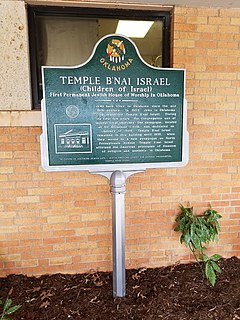
Temple B'nai Israel is a Reform Jewish congregation located in Oklahoma City, and is the oldest active Jewish synagogue in Oklahoma.
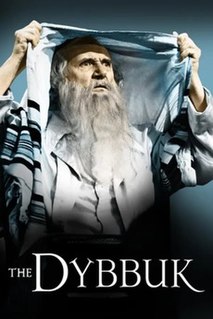
"The Dybbuk" is a 1960 television production of the Russian play The Dybbuk by Sholom Ansky, which was authored between 1913 and 1916 and is considered a Yiddish classic, with Cambridge University Press calling it "probably the most performed of any Yiddish play". It was directed by Sidney Lumet for The Play of the Week from an adaptation into English by Joseph Liss. The program, starring Carol Lawrence aired on October 3, 1960.













